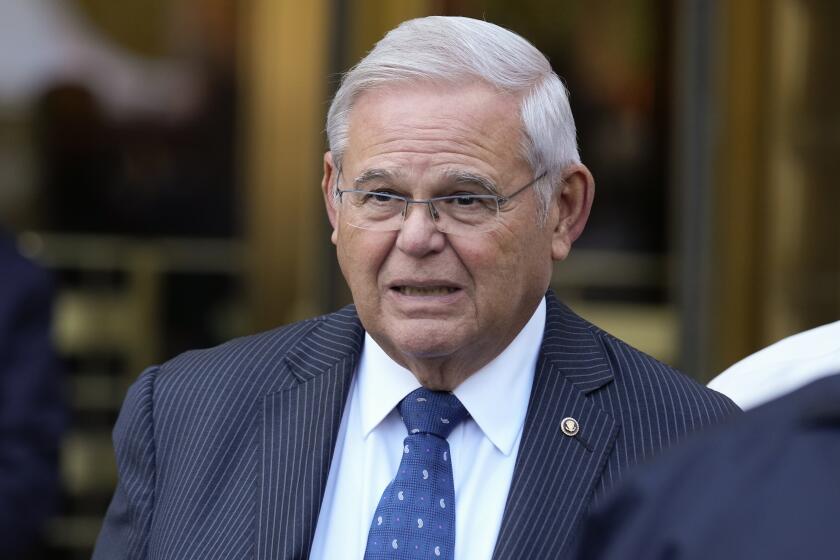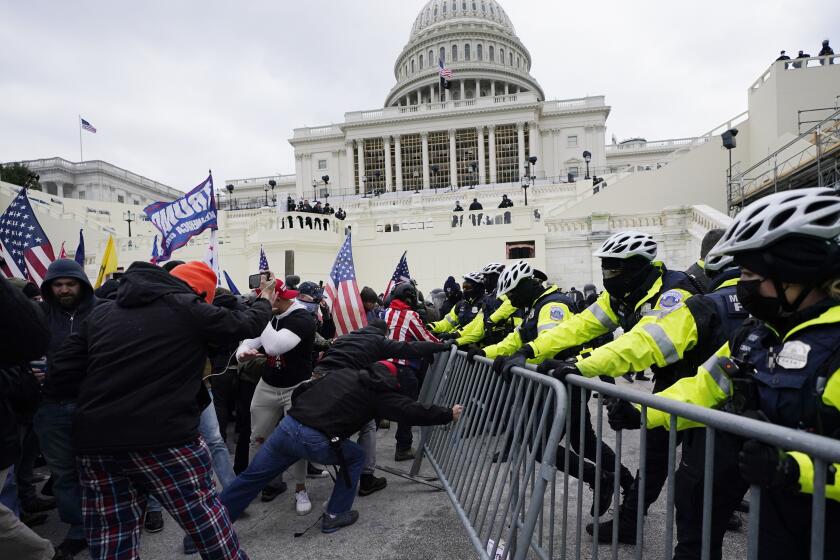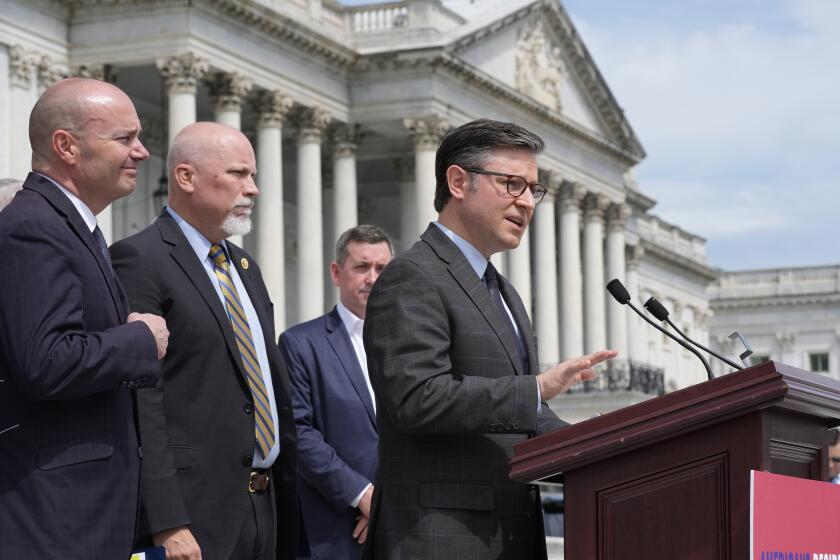Jackson Keeps Rivals, Backers Guessing on Race for Mayor : Politics: His real goal may be D.C. statehood and a seat in the Senate. Other mayoral candidates press him for a decision.
Jesse Jackson knows how to keep them guessing.
During his first race for President in 1984, the former civil rights leader had Democrats fretting over whether he would support the standard-bearer, Walter F. Mondale. When he ran again in 1988, he kept everyone wondering for months what he wanted in return for his support of Michael S. Dukakis.
And, now, Jackson is causing the same kind of consternation among the people of Washington, D.C., who want to know whether he is going to run for mayor now that incumbent Marion Barry has been sidelined by drug charges.
The question--Will Jesse run?--has drawn so much attention in recent weeks that some of the other Democratic candidates for the mayor’s job are publicly pleading for him to make up his mind. Among them is Sharon Pratt Dixon, who demanded that Jackson disclose his plans by 5 p.m. Feb. 2.
But Jackson, true to the pattern he has set over the years, refused to meet Dixon’s deadline. Instead, he announced that he will be unable to make a decision until Barry makes his plans known after he returns later this month from Florida, where he is undergoing treatment for substance abuse.
“The reality is that, when the mayor returns in late February . . . his decision is going to be critical to the options for service in the city,” Jackson said. “ . . . This is a delicate and sensitive situation; we’ll have to use all the time and thoughts and prayers necessary.”
Jackson’s friends and advisers say he intends to keep his options open at least until he returns from a trip to South Africa later this month and, perhaps, until the election filing deadline next July 5.
“Don’t expect an announcement soon,” said one adviser, who asked not to be identified. “One thing that’s constant--he doesn’t make a decision until he has to.”
Aides say that Jackson often keeps people guessing to draw attention to the issues he cares about as well as to allow himself the maximum amount of flexibility.
Until recently, according to his advisers, Jackson gave little thought to running for mayor of the District of Columbia, even though many people assumed that he was preparing to do so when he moved his principal residence from Chicago to Washington last year.
But Jackson’s options were dramatically altered on Jan. 18, when Barry was arrested for allegedly buying and smoking crack cocaine under FBI surveillance. The arrest opened up a critically important career choice for Jackson--one that his friend and adviser Ann Lewis likens to the two diverging roads in Robert Frost’s well-known poem, “The Road Not Taken.”
“It is an enormous decision for him,” Lewis said.
Publicly, Jackson maintains that he has very little interest in the job. In fact, his attitude toward the race has tended to be so skeptical that he recently convinced New York Times columnist and former editor A.M. Rosenthal in an interview that he would not run.
As he did in talking to Rosenthal, Jackson frequently observes that “the mayor’s office would substantially limit my ability for national and international service,” and he notes that Congress has much more control than the mayor over the budget of the District of Columbia.
Nevertheless, Jackson clearly has not ruled out running. Many people who have talked to him as recently as Rosenthal came away with the impression that he is still interested in succeeding Barry.
In fact, his willingness to consider the race has fueled a draft-Jackson movement led by a number of former Barry supporters whose influence in the city might be diminished by the election of one of the five other persons who have already declared their candidacies.
Also seeking the mayor’s job are Democrats Dixon, former vice president of the local power company; City Council President David A. Clarke; council members Charlene Drew Jarvis and John Ray, and Republican Maurice T. Turner, the former police chief.
A recent Washington Post poll indicated that Jackson, even though he certainly would be portrayed by his opponents as a carpetbagger, could defeat any of these lesser-known contenders.
Many Democrats, outsiders as well as residents of the District, argue that Jackson ought to run for mayor because his lack of experience in elected office has been a handicap in his quest for the presidency. In their view, it would disprove Barry’s controversial statement in an interview with the Los Angeles Times that “Jesse don’t want to run nothing but his mouth.”
One of the primary proponents of this view is Bert Lance, the Georgia banker who served as budget director in the Jimmy Carter Administration and has been a Jackson adviser since 1984. Lance said the mayor’s job would give Jackson a “platform” for his views on issues of national as well as international importance.
But Robert Borosage, a close Jackson adviser, said this view is advocated primarily by white Democrats who would like Jackson to abandon his presidential ambitions, believing that his candidacy is making it difficult for their party to choose a nominee who is sufficiently conservative to win the general election.
The Washington Post poll suggests that blacks, who represent 70% of the voting population in the District, are more strongly opposed to a Jackson candidacy for mayor than are whites. The survey showed that 53% of blacks opposed it, compared to 44% of whites.
But Jackson views the decision facing him as a more complex matter than simply running for mayor or continuing his quest for the presidency, according to his advisers. As he sees it, there is a third option open to him that most other people do not recognize--running for senator from the District of Columbia.
At present, of course, the District of Columbia has no voting representation in Congress because it is not a state. And the standard wisdom is that Congress will never bestow statehood on the District because its politics are too liberal for even the majority congressional Democrats.
But, ever since Jackson moved to Washington, he has been campaigning tirelessly to win statehood for the city. According to his aides, he has been telling Democrats that he would bow out of the presidential race if the District were granted statehood.
“Statehood would measurably affect my options,” Jackson said recently. “A senator has much more mobility than a governor. The Senate would allow me to serve nationally and internationally and be accountable to a local community.”
According to Jackson’s advisers, Congress might be persuaded to grant statehood to the District if it were paired with statehood for Puerto Rico, which would probably become a Republican state. Then neither party would gain an advantage.
Although many cynics have viewed his statehood campaign as a way for Jackson to ingratiate himself with the citizens of the District of Columbia in advance of running for mayor, Jackson adviser Lewis insists that Jackson sees it as a simple battle for civil rights.
Whether his campaign for statehood ultimately succeeds, Borosage said, Jackson’s supporters across the country are overwhelmingly opposed to his running for mayor in Washington and abandoning his nationwide drive to build a Rainbow Coalition of blacks, Latinos and working-class whites.
But perhaps the most significant factor weighing against a campaign for mayor is that Jackson is about to begin a nationally syndicated television talk show to be known as “Voices of America with Jesse Jackson.”
Lewis said that Jackson views the show as “an incredible opportunity” to influence Americans and would be reluctant to give it up to run for office.
On the other hand, although Jackson does not accept the argument that he needs practical experience in government, his advisers say that he sees the problems of the District--drugs, crime, poor schools, racial polarization--as a challenge he would like to tackle.
“This is a community in trouble--primarily an African-American country,” Borosage said. “He can demonstrate that African-American leadership can turn the city around. He can do the heavy lifting on drugs and education.”
More to Read
Get the L.A. Times Politics newsletter
Deeply reported insights into legislation, politics and policy from Sacramento, Washington and beyond. In your inbox three times per week.
You may occasionally receive promotional content from the Los Angeles Times.






